

Team working - Personal Development Aide Memoire - Resources - LSE LIFE - Students. What is team working?
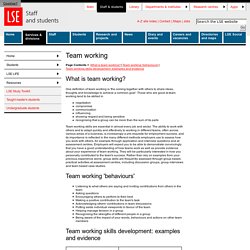
One definition of team working is 'the coming together with others to share ideas, thoughts and knowledge to achieve a common goal'. Those who are good at team working tend to be skilled in negotiation compromise communication influencing showing respect and being sensitive recognising that a group can be more than the sum of its parts Team working skills are essential in almost every job and sector. The ability to work with others and to adapt quickly and effectively to working in different teams, often across various areas of a business, is increasingly a pre-requisite for employment success, and its importance is reflected in the many different methods employers use to assess how you work with others, for example through application and interview questions and at assessment centres.
Team working 'behaviours' Key Employability Skill: Teamwork. Employability is defined, in line with the University Employability Policy and Strategy, as “the capability to secure and maintain satisfactory work”, and is all about what skills you have and how you can demonstrate to employers that you have these skills.
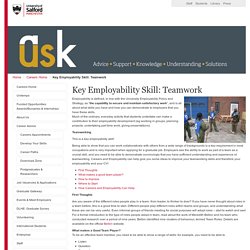
Much of the ordinary, everyday activity that students undertake can make a contribution to their employability development (eg working in groups, planning projects, undertaking part time work, giving presentations). Teamworking This is a key employability skill! Being able to show that you can work collaboratively with others from a wide range of backgrounds is a key requirement in most occupations and is very important when applying for a graduate job.
40 Business Acronyms and Business Abbreviations You Should Know - ALTA Language Services. These days, we don't always have the time to use full words or speak in complete sentences.
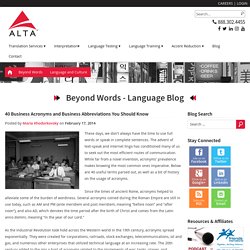
The advent of text-speak and internet lingo has conditioned many of us to seek out the most efficient routes of communication. While far from a novel invention, acronyms' prevalence makes knowing the most common ones imperative. Below are 40 useful terms parsed out, as well as a bit of history on the usage of acronyms. Since the times of ancient Rome, acronyms helped to alleviate some of the burden of wordiness. Several acronyms coined during the Roman Empire are still in use today, such as AM and PM (ante meridiem and post meridiem, meaning “before noon” and “after noon”), and also AD, which denotes the time period after the birth of Christ and comes from the Latin anno domini, meaning “in the year of our Lord.”
As the Industrial Revolution took hold across the Western world in the 19th century, acronyms spread exponentially. Work Advices on Podcasts.
Tips for the interview. Anglais. Dictionnaire - Traductions. Choses accomplies précédemment - Interview. What is Achievement?
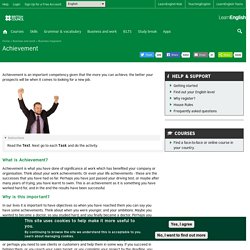
Achievement is what you have done of significance at work which has benefited your company or organisation. Think about your work achievements. Or even your life achievements - these are the successes that you have had so far. Perhaps you have just passed your driving test, or maybe after many years of trying, you have learnt to swim. This is an achievement as it is something you have worked hard for, and in the end the results have been successful. Why is this important? In our lives it is important to have objectives so when you have reached them you can say you have some achievements.
Teamworking. All employers are keen to recruit graduates who are able to cooperate, solve problems and work in teams.
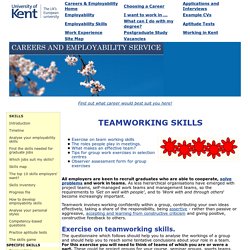
As less hierarchical organisations have emerged with project teams, self-managed work teams and management teams, so the requirements to 'Get on well with people', and to 'Work with and through others' become increasingly important. Teamwork involves working confidently within a group, contributing your own ideas effectively, taking a share of the responsibility, being assertive - rather than passive or aggressive, accepting and learning from constructive criticism and giving positive, constructive feedback to others.
Exercise on teamworking skills. The questionnaire which follows should help you to analyse the workings of a group and should help you to reach some tentative conclusions about your role in a team. For this exercise you will need to think of teams of which you are or were a part. Try to answer the 28 questions as honestly as you can. Your score.